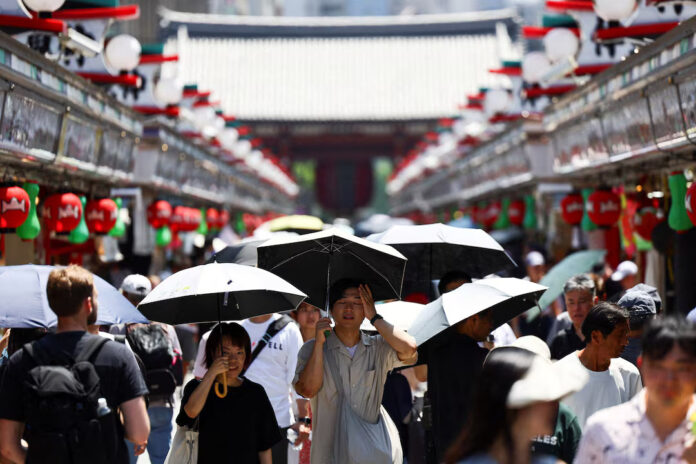
Japan recorded its highest-ever temperature on Tuesday, with the mercury hitting a scorching 41.8 degrees Celsius (107.2°F) in the eastern city of Isesaki, Gunma Prefecture. The record-breaking heat has sparked public health concerns and raised alarm bells over potential damage to the country’s rice crops, a vital staple already under strain from past weather events and supply miscalculations.
The Japan Meteorological Agency confirmed that Tuesday’s temperature surpassed the previous national record of 41.2°C, which was set just last week in the western city of Tamba, Hyogo Prefecture. The agency has warned that this summer may be one of the most extreme in the nation’s history.
“So far this summer, more than 53,000 people have been hospitalized due to heatstroke,” reported the Fire and Disaster Management Agency. Elderly citizens, outdoor workers, and children are among the most vulnerable groups, and emergency services remain on high alert.
“Today is murderously hot,” said Takeshi Ishikawa, a 63-year-old auto worker who was refilling his water bottle at a public fountain in Tokyo. “If it gets to 42 degrees, it would be hotter than my bath that I prepare at 40 degrees.”
Beyond human health, the sweltering heat and accompanying drought conditions have put immense pressure on Japan’s rice fields. The northeastern region along the Sea of Japan has experienced critically low rainfall, further compounding agricultural concerns. High temperatures have also caused an outbreak of stink bugs in several rice-producing areas, threatening yields and quality.
In response, Farm Minister Shinjiro Koizumi announced emergency measures to mitigate the impact of the weather on agriculture. “We need to act with speed and a sense of crisis to prevent damage,” Koizumi said during a press briefing. He outlined government plans to provide aid for pest control and drought resistance, and officially launched a policy aimed at boosting rice production to avert future shortages.
The sense of urgency stems in part from last year’s experience, when extreme heat in 2023 damaged rice quality, triggering an acute shortage. The crisis was worsened by government miscalculations in supply and demand, leading to historically high prices and widespread concern over food security.
Average temperatures in Japan have been climbing for the third consecutive July, and climate experts warn that rising global temperatures may make such heatwaves increasingly common. Government agencies are now under pressure to ensure that climate-resilient agricultural practices and effective emergency response plans are in place.
As Japan endures yet another scorching summer, officials are urging residents to remain indoors, stay hydrated, and remain vigilant, while farmers brace for yet another season of uncertainty.
Written By Rodney Mbua


















